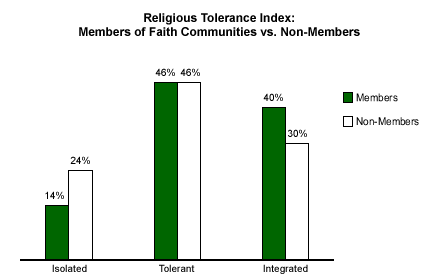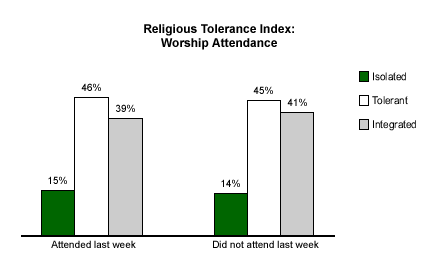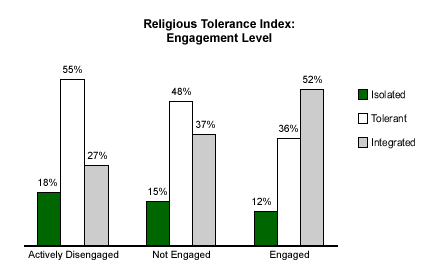Last in a five-part series on Gallup's new Religious Tolerance Index
Since the concept of religious tolerance deals with issues of faith, perhaps the final and most important question is how the strength and intensity of an individual's religious faith affects his or her attitudes toward other religions. To answer that question, we looked at three factors that appear to influence Gallup's new measure of religious tolerance: membership in a faith community, attendance at weekly religious services, and level of engagement within a congregation.
Initial research for the Religious Tolerance Index* separated Americans into three levels according to their responses to the survey. Isolated people are less likely than those who are tolerant and integrated to be members of any particular faith group, but if they are members, they tend to believe that their religion is right or true and all other religions are wrong or false. Tolerant individuals have a "live-and-let-live" attitude toward people of other faiths but are not particularly likely to go out of their way to try to learn more about other religious traditions. Integrated individuals tend to be engaged in faith communities, and also actively seek to learn more from others of different religious traditions.
Membership
It appears that belonging to a faith community may make a difference in one's attitude toward other religions. While those who are not members of faith communities are just as likely to be tolerant of other faiths as those who are members (tolerance levels for both groups are at 46%), members are more likely than non-members to be integrated (40% vs. 30%) and also less likely to be isolated (14% vs. 24%). These differences suggest that most faith communities are doing a good job in promoting respect for other faiths.

Attendance
Though membership in a faith community does seem to have a relationship with respondents' attitudes toward other faiths, their rate of attendance at religious services does not. There is virtually no difference in levels of isolation, tolerance, or integration between those who attend services regularly and those who do not. It appears that the amount of time that people spend attending religious services has little to do with their attitudes toward other religions.

Engagement
Gallup's data indicate that congregational engagement may be a critical factor in shaping people's attitudes toward other religious faiths (see "New Congregational Engagement Figures Released" in Related Items). Overwhelmingly, those who are engaged in their congregations are the most integrated in their views toward other faiths. Over half of those who are found to be engaged in their congregations are in the integrated group with regard to religious tolerance (52%) -- a rate almost twice as high as that among those who are actively disengaged (27%) and nearly 1.5 times as high as the percentage among those who are not engaged (37%).

Bottom Line
One might be inclined to think that those who are deeply engaged in their own faith communities -- and thus profoundly spiritually committed within their traditions -- would be more likely than others to disregard other faiths. In fact, just the opposite seems to be true. Those who are most engaged in their congregations are most open to learning from people of other faiths, are more likely to respect those of other faiths, and are more likely to feel respected by those of other faiths. The engaged are secure enough in their own beliefs to open themselves up to other perspectives.
Once again, engagement is the key: not only to growing healthy congregations and developing spiritually committed individuals, but also to creating positive attitudes toward the multitude of religious expressions found in our country.
*Results are based on telephone interviews with 1,000 adult members of a church, synagogue, or other religious faith community, aged 18 and older, and 500 non-members, conducted in November and December 2002. For results based on this sample, one can say with 95% confidence that the margin of sampling error is ±2.6%.
